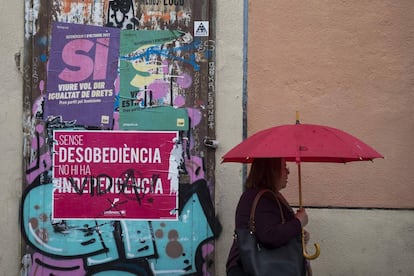A referendum in Catalonia? Yes, but not like this
The debate over the poll is highly polarized, but there is a middle-of-the-road position

It is a revealing fact that a lot of people in Catalonia don’t want to talk about it, out of weariness or out of fear of getting harassed by either side, or even by both at the same time. This is a small world where everybody knows each other. For instance, everyone knows where any given Catalan public figure – whether a politician, a writer, an athlete or a TV anchor – stands on the issue of independence. And everyone knows that the moment they open their mouth, they will be categorized into one of the two opposing sides.

In the midst of what is being described as an impending train crash, there is a clear tendency toward ideological polarization, while steering a middle course is frowned upon. But some people are choosing to get off the train.
A speech made last week inside the Catalan parliament by Joan Coscubiela, the speaker for the leftist group Catalunya Sí que es Pot, gave a voice to a middle-of-the-road position: those who defend a referendum, but not this particular referendum because of the questionable way in which it has been planned. In short: yes to a vote, but not like this.
I believe that the only way to solve this is through a referendum, but this is not the referendum that Catalonia needs
Joan Herrera, Catalan politician
One of the most commonly quoted statistics claims that 80% of Catalans want to express their opinion through a poll. The key resides in knowing whether all of those people agree with the vote that has been scheduled for October 1. It is not easy to find out. Many of the people consulted for this story said they did not want to be quoted by name.
Josep Cuní, one of the most popular journalists and TV personalities in Catalonia, admits that until now he had kept his distance, but that he is currently feeling annoyed.
“I am very critical about the manner in which this whole thing has been handled. Not so much because of the illegality, but because of the aesthetic aspects,” he says. “This might sound very snobbish and selective, but I think that respect and delicacy of manner is an essential part of Catalanism: a job well done has no borders, while a botched job has no future. Like [20th-century Catalan writer Josep] Pla used to say, ‘You go ahead and do whatever you like in life, but above all, never make a fool of yourself.’ That sense of ridicule is a big deal in Catalonia, where grandmothers routinely say, ‘Whatever you do, don’t draw attention to yourself’.”
We cannot wait two more years, the problem will not tolerate such a delay
Juan José López-Burniol, jurist
Cuní does not know what to do on October 1. “My position is very uncomfortable, because when you’re stuck between two trenches, you end up in the crossfire and then both sides accuse one another of having killed you; although at that point it bears noting that you’re already dead. We are now trapped in the Catalonia of la rauxa [rashness], of madness, of the loss of common sense. And every time we have done that in the past, we have crashed and burned.”
The writer Sergi Pàmies also admits to being “very pessimistic” about the situation.
“This is a problem without a solution, and sometimes we forget that this sort of problem also exists,” he says. “A problem is being left to be worked out by the judiciary system when it clearly extends beyond that dimension. It reminds me of the days when we had military service and conscientious objectors: the law used to force objectors to disobey the law until the law itself was changed. The law is not enough. The Constitution cannot remain constrained by those limitations, and the new Catalan law cannot be imposed with the same weapons. This combination of fixed positions is leading to an unfair solution. An injustice is being made in the name of injustice. This is a problem among democrats, but one might think otherwise: that it is a battle among radicals using the cover of democracy to avoid altering their own positions.”
“On the one hand we are seeing vintage examples of Falangist acts, with the Spanish Civil Guard searching news organizations, and on the other hand we have a disgraceful display of revolutionary radicals gathering in assemblies,” he adds. “And in the middle you have us, a vast majority of democrats, separatist and unionist alike, who are being left out by the dialectics of both extremes.”
This is a problem without a solution, and sometimes we forget that this sort of problem also exists
Sergi Pàmies, writer
The jurist and notary Juan-José López Burniol has been trying for years to get out of that trap. He has just published Escucha, Cataluña. Escucha, España (or, Listen, Catalonia. Listen, Spain) in tandem with former Socialist minister Josep Borrell, former Popular Party minister Josep Piqué and Francesc de Carreras, a jurist and university professor. The book’s subtitle is “Four voices in favor of mutual understanding and against secession.”
In an earlier book, España desde una esquina: federalismo o autodeterminación (or, Spain from the corner: federalism or self-determination), which he wrote in 2007, López Burniol warned that sooner or later the Catalan people would have to be consulted on the issue of independence. “It is absolutely inevitable,” he notes.
“At the time, I made a three-point proposal: recognizing Catalonia’s historical rights, exclusive power over identity issues (language, education, culture); and financial matters, which is the easiest part of all, with a ceiling on the solidarity fund and a shared tax agency,” he explains.
“At this point in the 21st century, coexistence should rest on a foundation of freedom, and the proposal must come from the central government. It’s like the school yard: when a bigger child and a smaller child fight, the bigger one has greater responsibility. To hear from Madrid, after five years, nothing more than ‘the Constitution does not allow it’ is a very poor kind of response.”
All that’s left for us to do is to keep our fingers crossed that something irreversible does not happen
Juan José López-Burniol
“But with equal clarity I say that what happened in the regional parliament the other day was a coup, and nothing solid can be built on that foundation,” he adds, alluding to the fast-track passage of legislation facilitating the referendum and the transition to an independent republic.
This expert feels that the situation is locked into place until October 1, and that “all that’s left for us to do is to keep our fingers crossed that something irreversible does not happen.” After that, there should be a new election, and the government that emerges should find some common ground with central authorities.
“All this is possible without changing the Constitution, because there’s no time for that anyway: we cannot wait two more years, the problem will not tolerate such a delay.”
The Catalan cause has had its own support outside Spain’s borders, with foreign celebrities defending the right to decide. One of the first signatories to such a manifesto was the historian Paul Preston, in 2014.
“I still feel that all people have the right to decide their own future, but that’s not to say that I like what’s happening with the current situation,” he says. “Mistakes have been made on both sides. There are many ways of reaching a solution, it’s a matter of negotiating, but this requires flexibility and tolerance from both parties, especially from Madrid.”
But positions are not etched in stone, and the vertiginous events of recent weeks are already shaping them, says Joan Herrera, former leader of the green group Iniciativa per Catalunya Verds
“I believe that the only way to solve this is through a referendum, but this is not the referendum that Catalonia needs,” he says. “However, the mood keeps swinging: last week, inside the Catalan parliament, the prevailing logic was that the end justifies the means, and you could feel that people were very critical of that; but then the [Spanish] state overreacted, politics are not responding, and all you see are judicial solutions, and so the mood swung again.”
The only issue that everyone seems to agree on is that the situation is very serious indeed, and nobody will venture to say how all of this is going to end.
English version by Susana Urra.
Tu suscripción se está usando en otro dispositivo
¿Quieres añadir otro usuario a tu suscripción?
Si continúas leyendo en este dispositivo, no se podrá leer en el otro.
FlechaTu suscripción se está usando en otro dispositivo y solo puedes acceder a EL PAÍS desde un dispositivo a la vez.
Si quieres compartir tu cuenta, cambia tu suscripción a la modalidad Premium, así podrás añadir otro usuario. Cada uno accederá con su propia cuenta de email, lo que os permitirá personalizar vuestra experiencia en EL PAÍS.
¿Tienes una suscripción de empresa? Accede aquí para contratar más cuentas.
En el caso de no saber quién está usando tu cuenta, te recomendamos cambiar tu contraseña aquí.
Si decides continuar compartiendo tu cuenta, este mensaje se mostrará en tu dispositivo y en el de la otra persona que está usando tu cuenta de forma indefinida, afectando a tu experiencia de lectura. Puedes consultar aquí los términos y condiciones de la suscripción digital.








































